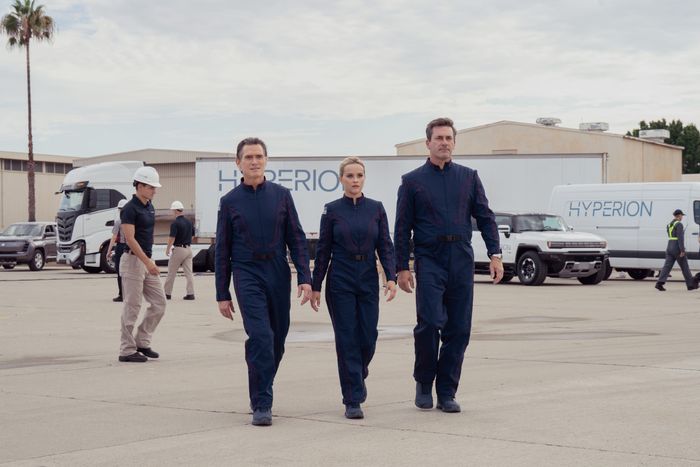
There are a few reasons The Morning Show’s 16 nominations jumped off the page when they were announced last month. For one, the noms were concentrated in a few high-profile spots on the ballot, namely acting. Two of the six contenders for Outstanding Lead Actress in a Drama went to Jennifer Aniston and Reese Witherspoon. Three of the seven nods for Supporting Actor in a Drama went to Billy Crudup, Mark Duplass, and Jon Hamm. Four of the seven Supporting Actress in a Drama nods went to Nicole Beharie, Greta Lee, Karen Pittman, and Holland Taylor. It was Succession-style category domination.
This year’s nomination haul marks a significant leveling up for the Apple TV+ series. Season one made a decent little splash at the 2020 Emmys, with eight total nominations and a win for Crudup. Two years later, the show only garnered three total nominations (including acting nods for Crudup and Witherspoon) for its much-maligned second season. Usually, once a show’s nomination totals begin to decrease year over year, they don’t get a rebound. But The Morning Show did just that as part of an overall groundbreaking year for Apple TV+. After breakthrough success with Ted Lasso and (to a lesser extent) Severance, Apple placed multiple shows in the top categories this year, including comedy series nominee Palm Royale and limited series Lessons in Chemistry. It also got its first-ever nominations in outstanding drama series with two shows: slovenly spy series Slow Horses and The Morning Show.
But The Morning Show isn’t just Apple’s most-nominated series. Among the major categories (acting, writing, directing, and series), TMS’s 11 nominations topped all shows. All! Not The Bear or Shōgun or The Crown. The Morning Show. Yet mention it in polite company and you’ll likely get more giggles and derision than not. How did the show that was the butt of every “Reese Witherspoon in space” joke perform better than the most critically lauded series on TV?
Explanation 1: The Show Got Better
Under new showrunner Charlotte Stoudt, The Morning Show’s third season bounced back from a chaotic season two to present a more coherent set of episodes in its third outing. I asked Vulture critic Jackson McHenry — a Morning Show expert of the first order — to weigh in on my sense that the show really did level up:
The Morning Show has always had a certain ineffable hold on me. (It’s actually pretty effable; it’s movie stars.) But it wasn’t until the third season that it came into its own as actually compelling television. The first season is a slog, built around a good idea — how a TV network reacts to a Me Too scandal — that was executed poorly and hamstrung by a weak Steve Carell performance as a Matt Lauer stand-in. The second season was a major step up in energy in that it became plainly bonkers, watchable in the way you can’t look away from something skidding off the rails. (Jennifer Aniston livestreams her experience with COVID! Carell drives off a cliff after hanging out with a woman making an anti-cancel-culture documentary! That Simon & Garfunkel needle drop!)
The third season has all that manic energy, but it channels it into a rather competent, almost self-aware, pulpy drama. Free from the Carell plot and injected with the energy of a new showrunner, the show is lighter on its feet, sending Reese Witherspoon’s Bradley Jackson to space in its first episode as if to say “we know this isn’t too serious,” then spending the rest of the season satirizing the collapse of network television — all, of course, funded by a tech giant. The scenes with Aniston and her new love interest, Jon Hamm, spark with actual chemistry; Nicole Beharie gives a show-stealing performance as she grills Holland Taylor about racism at the network; and, yes, Bradley Jackson was at the storming of the Capitol. The show matured into the kind of thing that’s rarely attempted anymore, and deceptively hard to pull off: a grand, old-fashioned prime-time soap. It only took some time and several truckloads of Apple money to get there.
Even as it’s matured, The Morning Show has retained a significant appeal for a media-savvy audience watching the show either partially or entirely for the camp value. It’s a tough needle to thread when a show is primarily earnest but — as Stoudt explained in her interview with Jackson at the close of season three — the series has begun to lean into its zany spirit. “One thing I’ve always loved about The Morning Show was the tonal slide, as we call it,” she said. “You can enter a scene that’s apparently dramatic and it can become absurd or vice versa. I think that’s emblematic of the time we’re living in.”
Explanation 2: The Succession Vacuum
In its final season last year, Succession ran roughshod over the Emmys’ drama categories, racking up 27 total nominations, 14 of them in the acting categories, and winning six of the seven major drama awards. That’s a significant void at the top of the mountain, and for much of the 2023–24 TV season, few contenders emerged to claim space at the summit. The Crown dropped an underwhelming final season in November. Shōgun seemed primed for limited series until FX made a last-minute strategy change in May. New shows like Mr. and Mrs. Smith, The Curse, and 3 Body Problem were discussed as contenders, as were established shows that had yet to catch on with Emmy voters like The Gilded Age and Slow Horses, but question marks were everywhere. What wasn’t anywhere was a drama that hooked the Zeitgeist like Succession had. Floating into that void, like Bradley Jackson in low-Earth orbit, came The Morning Show.
Of course, “just take Succession’s spot” is a task easier assigned than accomplished. HBO spent a whole year cycling through programs like The Regime and The Sympathizer that failed to catch the fancy of Emmy voters at all (Robert Downey Jr.’s sole nomination for the latter hardly counts as a win for a show about a biracial Vietnamese refugee in 1970s America), much less at the level of Succession. It’s telling that the show on HBO’s roster behaving most like Succession in terms of storytelling is Industry, which has been completely shut out by the Emmys thus far. (It’s forthcoming third season could change that — check back with us next year.)
And yet as most successful shows do, Succession casts a recognizable shadow over the current crop of TV dramas, even in ways that are likely accidental. Obviously, The Crown predates Succession, but you can’t really talk about the royals without getting into issues of monarchical bloodlines and a matriarch who might not think her heir apparent can hack it. Shōgun is based on 50-year-old source material, but as the show made its way from production to air, eyes must have lit up all over FX’s marketing department with recognition of the shows’ shared themes of dynastic inheritance. The Gilded Age? New money supplanting the old. Fallout? A child turns against a parent who has lost the plot.
As for The Morning Show, there are plenty of ways to make the argument that if you squint, it’s playing in the same sandbox that Succession did. Both shows are/were greatly cognizant of the grim state of American media. Both feature predatory tech billionaires out to dismantle legacy media corporations. Both killed off their problematic lead male characters in transit.
Explanation 3: Long-standing Voting Patterns
When it comes to Emmy voters, dramas take time to settle in. While three of the last six winners in Outstanding Comedy Series won for their debut seasons, that’s very much not the case in drama. Since Homeland won right out of the gate in 2012, only once has a debut season won Outstanding Drama Series (that would be The Handmaid’s Tale in 2017). For Emmy voters, a show with as much star power as The Morning Show gets hard to ignore three seasons in.
Explanation 4: The Strike
This one works hand in hand with explanations 2 and 3. Erratic production schedules normalized in the age of Peak TV — see Stranger Things producing four seasons over the course of six years — combined with the work stoppages of the WGA and SAG-AFTRA strikes meant that former Emmy faves The White Lotus, The Last of Us, House of the Dragon, Severance, Squid Game, Euphoria, Andor, Yellowjackets, and, yes, Stranger Things all sat out the 2023–24 Emmy eligibility window. Suddenly, that post-Succession void got even wider, and suddenly, The Morning Show was one of the rare dramas in contention with any kind of Emmy pedigree at all.
Explanation 5: The Campaign
The Morning Show didn’t just back its way into 16 nominations. Apple TV+ engaged in a savvy campaign, one which may have found support among the kinds of voters who gravitated toward Succession’s mirroring of the fraught media landscape or The Handmaid’s Tale’s feminist urgency.
The Morning Show’s third season had multiple Emmy-friendly assets to work with, not least of which was new cast member Hamm, who plays tech billionaire Paul Marks. Hamm is a huge Emmy favorite, an 18-time nominee across multiple shows (including 30 Rock and Unbreakable Kimmy Schmidt) and Best Actor in a Drama winner for Mad Men in 2015. Hamm is an actor Emmy voters tend to seek out in whatever context, evidenced by his dual noms this year for Fargo and The Morning Show. As one awards strategist put it: “TMS stars two of the most famous people in the world, with a very deep bench of fantastic supporting actors. You can obviously see that’s the case with the ten acting nominations. SAG members make up a huge percentage of voters, so being a show that clearly plays well with its performers helped it.”
TMS also benefited from a viral clip of a scene where new morning anchor Chris (Nicole Beharie) confronts UBS boss Sybil (Holland Taylor) over leaked emails that revealed Sybil making racist statements. Virality can be a double-edged sword, as viral clips can sometimes be silly or embarrassing to the source material, but in this case, it was a For Your Consideration clip — for Beharie, Taylor, and the show itself — that got passed around all over social media. Even the show’s January 6 story line, which garnered a lot of raised eyebrows and barely stifled laughter across social media (that would be the bad kind of viral), may have given more earnest voters a feeling that The Morning Show was dealing in important matters of the day.
Of course, despite The Morning Show’s smart and ultimately quite successful campaign, not everybody is quite so willing to acknowledge TMS as a standard-bearer for TV drama. When we broached the possibility that The Morning Show might become to Apple what Succession was to HBO, one insider at an AppleTV+ rival said, “If they truly think that is something that is possible, they are delusional. You have to be self-aware about your shows.” (I should note that in this case, the delusion is all mine, as no one from The Morning Show or Apple would comment for this article — whether to compare the show to Succession or otherwise.)
More Gold Rush
- Bowen Yang and Rachel Sennott Are on Oscar-Nominations Duty
- Our Final Guesses for the 2025 Oscar Nominations
- The Five Oscar Nominations We’re Most Afraid of


